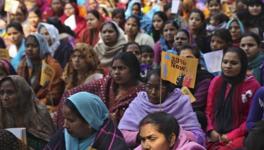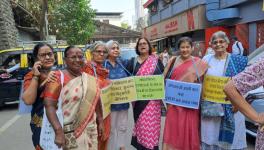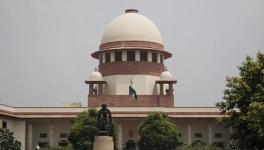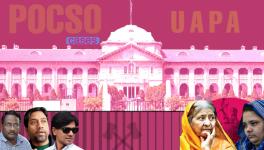Marital Rape: Supreme Court to Hear Batch of Petitions on September 16
Image Courtesy: boomlive.in
On September 9, 2022, the Supreme Court adjourned a batch of petitions arising out of the Delhi High Court's split verdict on the issue of criminalisation of marital rape on September 16. Two petitions arising out of the high court's verdict came up for hearing before a bench comprising Justices Ajay Rastogi and BV Nagarathna. During the hearing, the Bench said that it would tag all similar matters together.
This comes following the Delhi High Court's divided decision from May 11. The Court reached a decision, with one judge advocating the reading down of the legal exemption protecting spouses from prosecution for forced marital sex on their wives, while the other judge refused to declare it unconstitutional. However, given that the case includes important legal issues that the Supreme Court must decide, both judges had concurred in giving the certificate of permission to appeal to the High Court.
According to Justice Rajiv Shakdher, it is unconstitutional to shield the husband from prosecution for the crime of marital rape. He ruled that the exception 2 of the IPCs 375 and 376B was invalid since it violated Article 14. Justice C. Hari Shankar, however, declared that he disagrees with Justice Shakdher. According to Justice Harisankar, Section 375's Exception 2 is not unconstitutional and is founded on an understandable difference. The issue raised by the current appeal for review in the Supreme Court is whether section 375(2)'s exclusion for marital rape from the crime of rape is unconstitutional and in violation of articles 14, 15, and 21.
The plea was submitted by All India Democratic Women's Association (AIDWA), a women's group with 9.6 million members. The advocate for one of the appellants stated that they are asking the Supreme Court to determine the important legal issue at hand. According to the petition, the contested clauses violate Articles 14, 15, and 21. The appellant has a strong case on the merits, and there is a prima facie case that the provisions are unconstitutional, it was noted. Millions of women have been sexually assaulted legally as a result of the conflict over consent in marital rape that exemption two of 375 of the IPC generated. The petition argued before the Delhi High Court that married women like her should have the ability to hold their husbands accountable for rape.
The plea also argues that the provision for marital rape shields spouses from a number of offenses. The appeal notes that after the 2013 modification, non-consensual sexual actions outside of penile-vaginal intercourse have been included within the purview of Section 375 IPC. The appeal stated that as a result, a woman who is raped by her husband in 2022 is in a worse situation than a woman under Lord Hills' decree, which first excused males from marital rape 300 years ago. As reported by LiveLaw, the plea states, "Lord Hill had explicitly clarified that her husband would not be exempt from prostituting his wife or facilitating forced sex by another."
Since her husband is barred from raping his wife, he would unavoidably be excluded from section 376 and other gang rape laws. The plea noted that this is what the Delhi High Court referred to. The appeal petition further emphasises that the women who are raped by their husbands do not have the same legal protection as other rape survivors.
As reported by LiveLaw, the appeal further reads, “That the effect of the exception to marital rape is a resultant anomaly that the specific actus reus, the harm and indeed the mens rea to commit forced sexual intercourse remains punished. The husband who has committed an act of forced sexual intercourse, might be prosecuted under a lesser provision that does not seek to regulate forced sexual intercourse in the first place. If a woman's complaint of marital rape is registered under Section 323, 354, 498 A of the IPC, vital evidence of rape which would have otherwise been collected by the police would not be collected with without which even offenses under section 323 IPC becomes difficult to prove.”
The petition also contended that because the IPC was enacted before the Constitution, there is no presumption that it is valid. In the cases Joseph Shine v. Union of India and Navtej Singh Johar v. Union of India, the Supreme Court's Constitution benches upheld this. "The fact that Parliament chose not to amend the MRE despite recommendations of the Verma committee report is merely a neutral fact that can have no bearing on the Supreme Court's assessment of its constitutionality and the provision continues to have no presumption of constitutionality," as reported by LiveLaw.
Additionally, AIDWA claimed that numerous high courts have at various times questioned the constitutional validity of the provision in the appeal. The appeal also emphasised the necessity to offer immediate relief to women who are compelled to have non-consensual sex with their spouses and have virtually no nearby legal options in order to push for interim relief. The appeal argued that because of the length of time needed to make a judgment, wives across the nation will continue to be raped with impunity.
Due to the Marital Rape Exception, several wives daily endure unimaginable physical, mental, and emotional harm while their husbands escape punishment. The Supreme Court stopped the filing of fresh FIRs, the continuing of investigations, and other coercive actions for sedition under Section 124 of the IPC in SG Vombatkere v. Union of India. The appeal hoped that a similar direction would be granted in this petition. The appeal requested a stay of the marital rape section 375 (2) based on these justifications.
According toLiveLaw, the petition states,"….remarks in this vein maybe interpreted as belittling the trauma of the victims of marital abuse and seen as a kind of endorsement of the view that forceful sexual intercourse in a marriage is not a big deal."
Court’s stand on marital rape prior to this
In 2018, the apex court, while striking down adultery as an offence under IPC, touch upon contours of marital rape by stating that “curtailing the sexual autonomy of a woman or presuming the lack of consent once she enters a marriage is antithetical to Constitutional values.”
The Supreme Court has time and again, whenever it has been seized of the matter, has refused to criminalize marital rape while holding that it was for the legislature to make laws.
In 2015, the apex court had refused to entertain a Delhi woman’s plea to declare marital rape a criminal offence, saying it wasn’t possible to order a change in the law for one person. Her position was of a survivor as she complained that her husband repeatedly resorted to sexual violence, but she was helpless because of the legal position.
In 2019, the Supreme Court once again refused to entertain a plea filed by a lawyer, since the Delhi High Court was already seized of the matter.
In 2018, Gujarat High Court (in Nimeshbhai Desai vs State Of Gujarat; decided on 2 April, 2018) has recognised marital rape to be a “disgraceful offence” that has scarred the trust and confidence in the institution of marriage and also admitted women’s sufferings due to non-criminalisation of the offence.
The government is hesitant to criminalise the marital rape because it would require them to change the laws based on the religious practices, including the Hindu Marriage Act, 1955 which says a wife is duty bound to have sex with her husband, the court had observed. The court could not prosecute the husband for rape and instead directed that section 354 of IPC, for outraging the modesty of the wife, be invoked.
In 2017, the Supreme Court in Independent Thought vs Union Of India (decided on October 11, 2017) read down the exception 2 to section 375 of IPC as follows: “Sexual intercourse or sexual acts by a man with his own wife, the wife not being 18 years, is not rape”.
This was done to make the penal law consistent with the provisions of Protection of Children from Sexual Offences, (POCSO) Act which criminalizes sexual acts with a person below 18 years of age. Thus, only criminalising marital rape if the wife is below 18 years of age.
Some facts and figures
According to a National Family Health Survey report (2015), 5.4 percent of married women between 15-49 years of age in India reported that their husbands had physically forced them to have sexual intercourse against their will. At least 2.5 per cent women reported that their husbands physically forced them to perform any other sexual act without their consent.
The Justice Verma committee, 2013 had recommended that marital rape be made an offence under IPC and it be specified that relationship between the accused and the complainant is not relevant to the inquiry into whether the complainant consented to the sexual activity. The Committee had also stated that any intimate relationship of the complainant and the accused should not be regarded as a mitigating factor for justifying a lower sentence for the crime.
In 2016, the government told the Rajya Sabha the concept of marital rape, as understood internationally, cannot be suitably applied in the Indian context due to factors such as illiteracy, poverty, social customs and values, religious beliefs and mindset of the society to treat marriage as a sacrament.
Get the latest reports & analysis with people's perspective on Protests, movements & deep analytical videos, discussions of the current affairs in your Telegram app. Subscribe to NewsClick's Telegram channel & get Real-Time updates on stories, as they get published on our website.
























